Redwood offers natural resistance to decay and insects, making it ideal for outdoor benches exposed to weather. Acacia provides a dense, durable hardwood with a rich grain, suitable for both indoor and outdoor benches requiring longevity and aesthetic appeal.
Table of Comparison
| Feature | Redwood | Acacia |
|---|---|---|
| Durability | High resistance to decay and insects | Very durable, dense hardwood |
| Appearance | Warm reddish tone, straight grain | Rich golden-brown with varied grain patterns |
| Weight | Lightweight, easy to handle | Heavier and denser than redwood |
| Maintenance | Requires periodic sealing for outdoor use | Low maintenance, naturally water-resistant |
| Cost | Moderate price | Higher price due to hardwood quality |
| Best Use | Ideal for lightweight, decorative benches | Suitable for sturdy, long-lasting benches |
Overview: Redwood vs Acacia for Benches
Redwood and Acacia are popular choices for benches due to their durability and aesthetic appeal. Redwood offers excellent resistance to decay and insect damage, making it ideal for outdoor furniture exposed to elements. Acacia is valued for its rich color variations and hardness, providing strong, long-lasting benches with natural water resistance.
Visual Appeal: Redwood and Acacia Grain Patterns
Redwood features rich, deep reddish hues with straight, consistent grain patterns that offer a smooth and elegant visual appeal for benches. Acacia displays a more varied, swirling grain with contrasting shades of brown and golden highlights, providing a dynamic and rustic look. The choice between Redwood and Acacia for bench wood hinges on whether a uniform, warm aesthetic or a diverse, textured appearance is preferred.
Durability and Lifespan Comparison
Redwood offers excellent durability for outdoor benches, resisting decay and insect damage due to its natural tannins, with an average lifespan of 20 to 30 years when properly maintained. Acacia, a dense hardwood, provides superior strength and is highly resistant to weathering and rot, often lasting 25 to 40 years with regular care. Both woods are strong choices for benches, but Acacia generally outperforms Redwood in long-term durability and lifespan in harsh outdoor environments.
Weather Resistance: Outdoor Bench Performance
Redwood offers superior weather resistance for outdoor benches due to its natural oils and dense grain, which protect against moisture, decay, and insect damage. Acacia, while durable and hard, requires regular sealants or finishes to maintain its resilience against rain, sun, and temperature fluctuations. Over time, Redwood benches maintain their structural integrity and aesthetic appeal better in harsh weather conditions compared to untreated Acacia.
Maintenance Requirements
Redwood benches require minimal maintenance due to their natural resistance to decay, insects, and moisture, often needing only occasional cleaning and a protective sealant every few years. Acacia benches, while durable and dense, demand more frequent maintenance, including regular oiling and sealing to prevent drying, cracking, and weather damage. Choosing redwood reduces long-term upkeep efforts, making it ideal for outdoor benches exposed to varying weather conditions.
Sustainability and Eco-Friendliness
Redwood benches offer high sustainability due to their natural resistance to decay and pests, reducing the need for chemical treatments, and are often sourced from sustainably managed forests certified by FSC. Acacia wood also scores well in eco-friendliness, as it grows quickly and absorbs significant carbon, but some concerns arise from deforestation and non-certified harvesting practices. Choosing FSC or PEFC-certified wood for either redwood or acacia ensures responsible forest management and minimizes environmental impact for a sustainable outdoor bench option.
Workability and Crafting Ease
Redwood offers excellent workability due to its straight grain and soft texture, making it easy to cut, shape, and sand for bench crafting. Acacia, while harder and denser, provides good durability but requires sharper tools and more effort to achieve fine detailing. Both woods finish well, but Redwood's natural softness allows for faster crafting without compromising structural integrity in benches.
Cost and Market Availability
Redwood benches typically cost more due to their durability and natural resistance to decay, making them a premium choice in outdoor furniture. Acacia offers a more budget-friendly alternative with widespread market availability, favored for its attractive grain and moderate weather resistance. While redwood is less common and often sourced from specific suppliers, acacia is readily available through most garden centers and lumberyards.
Comfort and User Experience
Redwood benches offer exceptional comfort due to their natural resilience and smooth grain, providing a warm, inviting seating experience that adapts well to outdoor environments. Acacia benches are praised for their sturdiness and ergonomic design, often featuring contoured surfaces that enhance user comfort during prolonged use. Both woods provide durable options, but redwood's softer feel generally results in a more pleasant tactile experience for users.
Best Choice: Redwood or Acacia for Benches
Redwood offers superior decay resistance and natural insect-repelling properties, making it a durable and low-maintenance choice for outdoor benches. Acacia, known for its dense hardwood structure and rich, warm tones, provides excellent strength and weather resistance but requires regular sealing to maintain its appearance. For long-lasting outdoor benches with minimal upkeep, redwood is generally the best choice, while acacia suits those seeking a robust hardwood with a striking finish.

Infographic: Redwood vs Acacia for Bench
 azmater.com
azmater.com